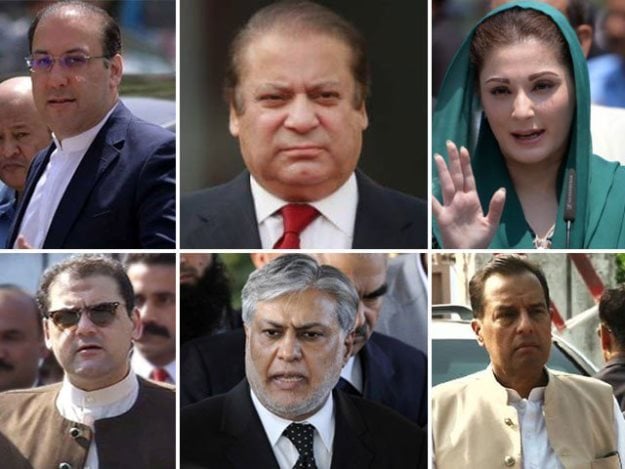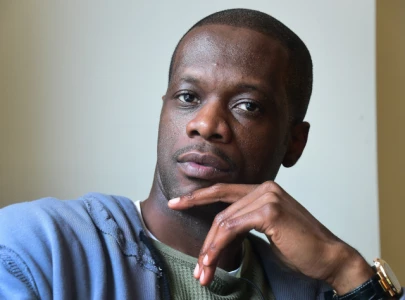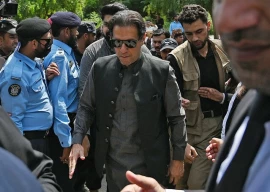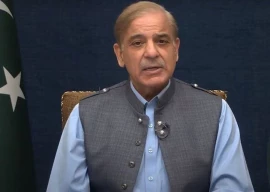
The top graft watchdog had submitted an application to Justice Ijazul Ahsan, seeking permission to record statements of the six members of the JIT, which it said was essential to finalise corruption references against the Sharif family.
Justice Ahsan has been appointed by the chief justice to supervise and monitor the implementation of the apex court verdict in the Panamagate case.
In this regard, the Supreme Court Registrar Office has written a letter to JIT head Wajid Zia, instructing him that the JIT members should record their statements before NAB in order to ensure that all legal requirements and formalities are fulfilled.
NAB gears up for references against Sharifs
“I am directed to state that while considering the request of NAB dated August 19, the Hon’able monitoring judge of this court has been pleased to direct that in order to ensure that all legal requirements and formalities are fulfilled and to avoid any possible lacuna that may damage the case, let the head of the JIT and any other concern member who had collected the relevant evidence … record their statements before NAB,” reads the letter
Meanwhile, the Sharif family’s legal team has expressed serious concern over the order passed by the monitoring judge. “This is not going to be a report of the witness. It is going to be a statement of the monitoring judge of the Supreme Court,” a senior member of the legal team told The Express Tribune.
The Sharif family had strongly reacted to the appointment of the monitoring judge. They contend that the Constitution does not confer upon the top court any jurisdiction to superintend and oversee the proceedings of accountability courts in the Panamagate case.
The Sharif family, in its review petition, said: “It is not understood what the monitoring of a trial by a judge of the apex court of the country will entail.”
References against Sharifs: NAB wants to quiz JIT
“It is not understood if the overseeing by a judge of the apex court of the trial is meant to enable the overseeing judge to issue directives to the trial court.
“If so, the review petitioners’ ultimate right of appeal to the apex court would stand compromised on account of the involvement of the apex court in the conduct of the trial,” it added.
“If, on the other hand, the overseeing of the trial by a judge of the apex court is only meant to make the trial judge aware of the fact that his adjudicatory exercise is being monitored by an honourable judge of the apex court who has already opined about material aspects of the defence of the accused, in a manner unfavourable to the accused, then the right of the Review Petitioners to a free and fair trial stands vitiated,” the review petition read.
Likewise, Supreme Court Bar Association president Rasheed A Rizvi also objected to monitoring of NAB proceedings in the Panamagate case. Legal experts say the Supreme Court does not share the method on which a judge will supervise the proceedings.
Panamagate review petition: Sharif family challenges top court’s jurisdiction
However, this is not the first case wherein the Supreme Court is monitoring NAB’s proceedings. There were instances in the past when NAB proceedings had been monitored by apex court judges.
In December 2009, a 17-judge bench constituted monitoring cells aimed at keeping an eye on the progress on re-opened cases of NRO (National Reconciliation Ordinance) beneficiaries. Justice Ghulam Rabbani was designated head of the central monitoring cell. Likewise, similar cells had been established at all four high courts where the chief justices concerned had monitored the progress and proceedings in all NRO cases.
The then Supreme Court judge and incumbent chief election commissioner, Sardar Muhammad Raza, while writing an additional note in the NRO case, had observed that NAB cases should not be dealt with in an exceptional manner.
“The Supreme Court has never adhered to suo motu monitoring during the stage of investigation or trial out of dignity, grace and judicial unconcern,” the judge wrote. “The apex court, therefore, should monitor every wrong but on the application of the aggrieved party.”
NAB inquiry mere eyewash: Sanaullah
“There are millions of cases pending in trial courts of the country but the high courts or the Supreme Court never monitor these cases through a particular cell unless the wrong done is brought to its notice.
“I am, therefore, of the view that this court should monitor the cases related to the non est NRO 2007 in usual manner that it normally adheres to,” Justice Raza had observed.
The normal course is that orders are passed and directions issued to a lower forum in a matter pending before such forum during hearing under appellate, review or constitutional jurisdiction of the court.
Sharif’s review petition
Deposed prime minister Nawaz Sharif on Saturday filed a fresh review petition against the Supreme Court July 28 order, passed by the three-judge bench, headed by Justice Ejaz Afzal Khan.
The review has been filed through his counsel Khawaja Haris. However, the petitioner has taken the same ground which he had taken in the first review petition filed against the five-judge bench headed by Justice Asif Saeed Khosa.

















COMMENTS
Comments are moderated and generally will be posted if they are on-topic and not abusive.
For more information, please see our Comments FAQ